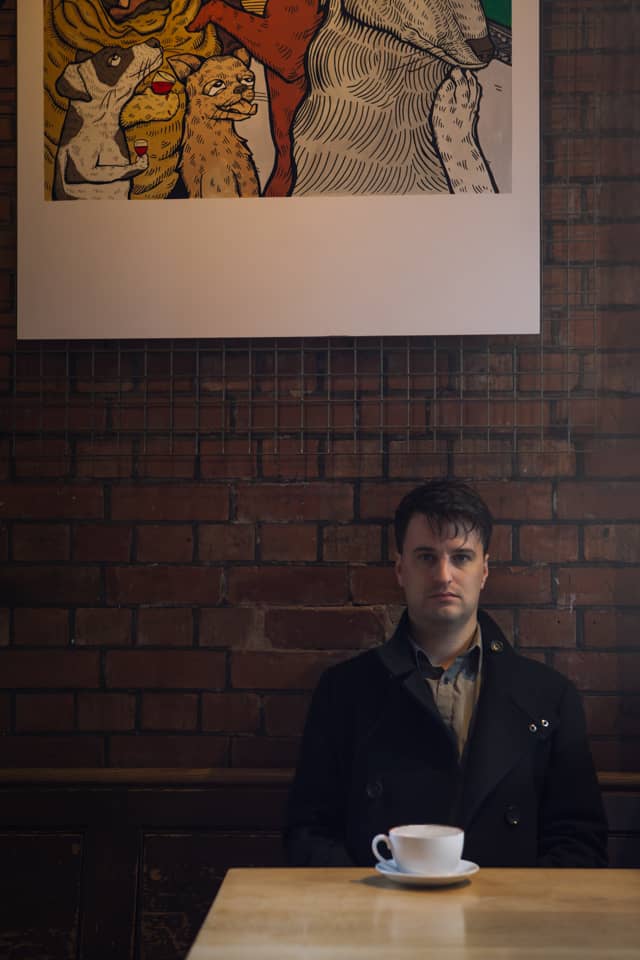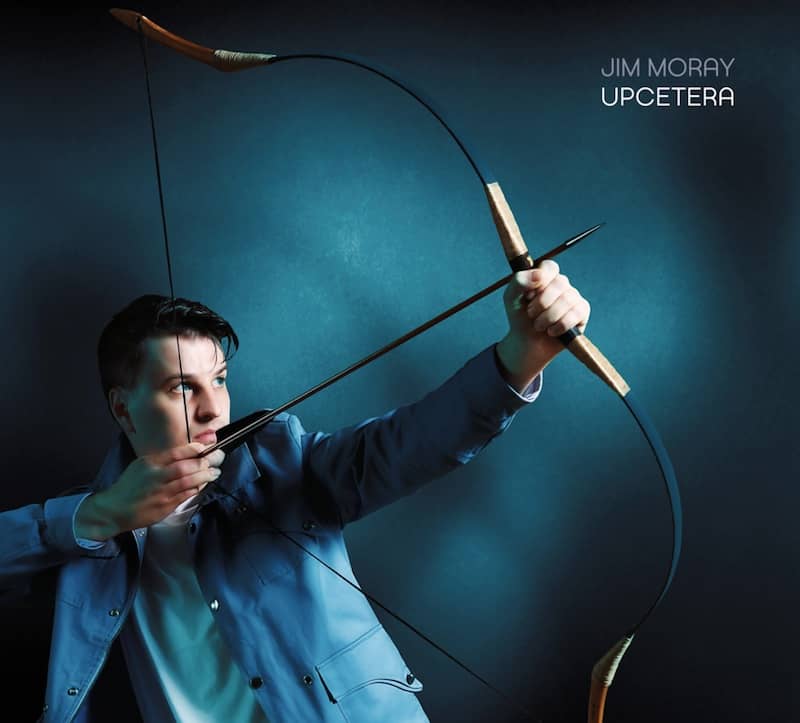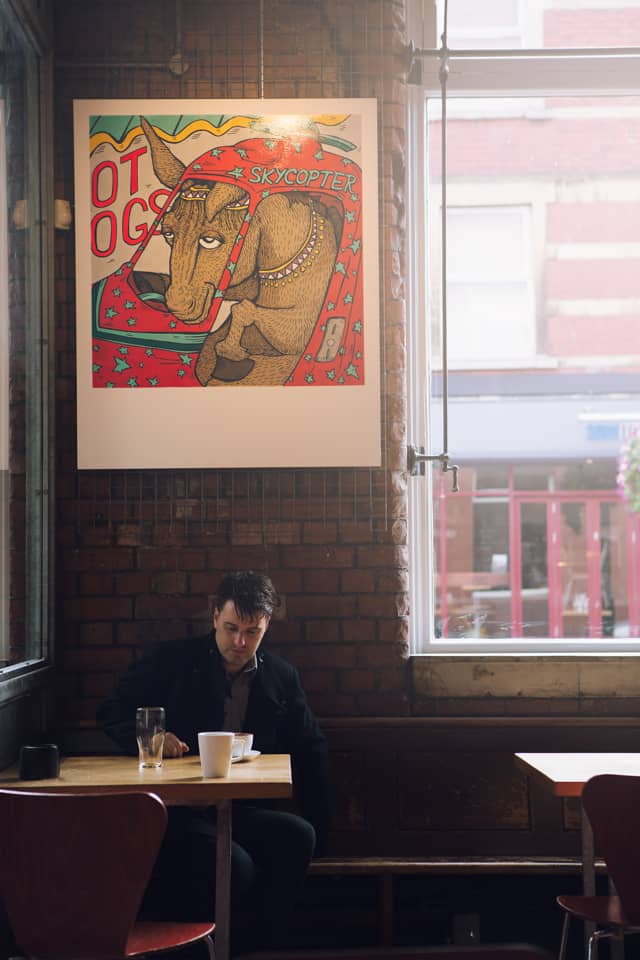“You have to know about the past in order to understand the future,” remarks Jim Moray as we discuss the relevance of traditional folk stories in today’s world.
It’s no more than a passing comment, but it sticks with me, and I’m still reflecting on it as I drive home later that evening. It strikes me that the reason this statement keeps resurfacing in my mind is that, in many ways, it perfectly encapsulates the hour-long conversation I’ve just had with the acclaimed singer and producer…
When I meet up with Jim Moray on a mid-week afternoon in Bristol, my overall impression is that he’s in a positive place. He’s excited to talk about his current projects…writing the second False Lights album, production, TV work (he’s just written music for the new Dr. Who spin-off series ‘Class’) and our primary topic of conversation; the release of Jim’s latest solo album ‘Upcetera’ (read the Folk Radio UK album review here).
In the weeks since it’s release, Upcetera has attracted significant attention and comment from the folk community. Reviews are universally positive; many reviewers being keen to position Upcetera as the latest milestone in Moray’s innovative and impactful solo career reaching back to 2003’s landmark ‘Sweet England’ album.
For Jim himself, however, this latest album is not part of any continuum. Throughout our conversation, he repeatedly makes it clear that in his own mind, his previous career as a solo artist is now closed. Upcetera is something different; a fresh start…a ‘New Chapter.’
It’s a principle that clearly holds great importance for Jim to the point that, in contrast with our conversation about his current projects, he’s visibly uncomfortable when discussing the past. He searches for ways to respond to my questions, his body language giving away his lack of comfort with the subject matter. It’s clearly a source of emotional pain; I sense that in particular there’s something specific…on a number of occasions he comes close to talking about it, but then each time stops short and changes the subject.
I respect his boundaries and don’t press him on the matter…we have ample other ground to cover. Nonetheless, there are aspects of Jim’s career that I feel compelled to understand, particularly those that have contributed in some way to the creation of the new album. You have to know about the past in order to understand the future…
“I gave up a few years ago” he explains, when I ask where the impetus for Upcetera initially came from, “I just decided I wasn’t going to do it anymore. About the end of 2013, I’d had enough. At that point…, I’d left university in 2003, and I was already touring then…so I’d been doing it eleven, maybe twelve years. I think if you release records as most people do these days, you release everything yourself, you manage yourself, you’re the person who has to turn your hand to designing the covers…you don’t have the budget to have lots of other people to work with. You’re constantly maintaining your brand, and that’s really tiring…just talking about yourself to big yourself up constantly for ten years straight. I just decided I wasn’t really interested anymore.”
Having already started work on his next album, Jim put the hard-drive away in a cupboard and instead threw himself into the False Lights project, the folk-rock band he formed alongside singer and guitarist Sam Carter. “I wasn’t going to give up music entirely” he explains, “the thing I was giving up was talking about myself…being so solipsistic…it being all about me. I didn’t mind being in a band.”
Between the immediate success of False Lights and growing demand for Jim’s skills as a producer and mixer, his solo work lay dormant for two years until a visitor enquired about it. Playing back the ideas he’d started two years previous prompted Jim to recommence working on them. Returning to his youthful habits of spending thirteen to fourteen hours a day on making a record, within six months the record we now know as Upcetera was finished.
It’s a record that Jim is deservedly proud of; “I sat in the mastering room listening to it coming back through the speakers, and that was the first time I had a feeling of ‘Actually I think this is probably quite good’…because you can never tell. A couple of the records I’ve made I’m really embarrassed by now, but you don’t get that feeling until later…you can’t weigh it up.”
“I think this one sounds more obviously like folk music” he continues. “The songs I’ve written for this album seem far more like traditional songs than previously. I think I’ve just got a lot better at it…I hope. It’s partly from working with other people, I’ve been doing production jobs where somebody has to be the adult in the room, somebody has to be the one making decisions and keeping it moving forwards. A lot of it is psychology I think. I’ve just got a little bit better at zooming between the macro and the micro, the big picture, and the detail. I suppose that’s what you need a producer for really, that’s the skill…to be able to keep both of those in perspective.”
The use of strings on the new album has been a notable point for many reviewers, and Jim observes that arrangement-wise it’s an improvement compared to previous work;
“I studied classical composition, and my first album came from that world because I was still studying at that point. Somewhere along the way, I got sidetracked into other things. It almost feels like a conscious dumbing down looking back on it now. I think maybe I’d got it into my head to try to be all things to all people, I can hear where it’s been restricted on my previous records, so I’d lost a lot of my musical knowledge in the intervening time because I’ve gone off and played more simple music. This felt a bit like trying to expand back into things I used to be able to do perfectly well. I’ve just lost a lot of ground since then.”
Another contributing factor to Jim’s satisfaction with Upcetera is the relative freedom he had to work on it;
“This is the first one I’ve done without really having anybody else who needed to have input into the record. I didn’t have somebody saying that ‘it’s got to be finished by this date because we’ve booked the tour,’ or ‘we’ve booked the tour into these types of rooms so you must have a fast one’…there was none of that. It was just making music that hung together. There was always the possibility of taking more time with this record as there was no deadline, no pressure. I hadn’t told many people I was working on it, so if it wasn’t happening there was always the option to put the hard-drive back in the cupboard and not tell anyone I’d done it. So had it not have worked it wouldn’t have come out…and there were things that didn’t work, but I think that’s why it hangs together because I only selected the things that felt right.”
Our conversation diverts to the topic of traditional music, the mainstay of much of Jim’s work including Upcetera…and the issue of what can be classed as an ‘authentic’ presentation, a subject close to Jim’s heart. I ask Jim whether, earlier in his career, he felt opposed by some people in the way that he chose to present traditional music;
“I think I did actually” he concludes after pausing to reflect, “I probably wouldn’t have owned up to that in the past. People misinterpreted it as provocation. Occasionally the Telegraph or the Guardian would write that I was ’sticking two fingers up at the folk establishment’ and that idea has always quite upset me. The expectation was ridiculous as far as I was concerned and always has been. It’s based on assumptions that people have made that just aren’t true about what is and isn’t an acceptable way to present traditional songs. I grew up with traditional music, my parents’ record collection was full of that stuff. But there’s something to be said for outsiders who don’t have any preconceived notion coming into folk music and just discovering it for themselves. I sort of envy those people – someone like Stick In The Wheel, who didn’t grow up with it and get to come in and decide what they want to do, what they like and what they don’t, without having a whole weight of history behind them.”
As we start to reflect on Jim’s early career, it’s clear that coping with expectations from others played a significant part in some of the difficulties he experienced and that eventually led to the decision to spend time away from solo work;
“It’s very hard to talk about how the folk scene was in the early 2000’s because it’s so different now” he explains. “A huge amount of ground is completely different. I think then people were desperate for young people to be playing English folk music because you could count them on the fingers of a maimed hand…people that were playing English music, were young, were exciting and had some ambition. So anybody that came along was seized upon immediately. A few of us came along at the same time who were male English folk singers, of which there had been very few for the preceding twenty years, or certainly of that generation. All of the people who went to folk clubs in the 70’s were looking for a Nic Jones or a Martin Carthy or a Barry Dransfield… you come along, and everybody wants you to be the thing they’ve been waiting for. But then they have all have different expectations and how you square all of those…I think it knocked me off course for a really long time, emotionally for a very long time, just living up to expectations that I never wanted.”
“Even things like my first record” he continues, “just through necessity, because it was being recorded in a terraced house, it’s got a few bits of real drums in it, but it’s mostly sampled. Immediately it got written about as being some sort of dance music cross-over…but I’ve never been into dance music, I find clubs really boring, that’s not stuff I’m interested in. I think a lot of people then bought the record and were bitterly disappointed because of the way it had been described to them. At the same time, people wanted some sort of charismatic frontman, and I’m not that either. So that weight of expectation bogged me down. There were times in that period when I wasn’t well… I wasn’t really a functioning human being so I needed that time off to close the door on one thing and start a new chapter. It’s hard to talk about it objectively. I’m proud of some of the records, and I’m proud of some specific songs. The thing I’m aiming for has never really changed; it’s always been approaching the same problem from different angles. The sort of music I want to make hasn’t particularly changed…it’s just how to get there.”
I probe Jim further…what is the problem he’s trying to solve…what type of music does he want to make?
“I’ve been trying to make modern music using traditional songs, that can stand on its own merit…which sounds really simple, but because of the way it is I think it’s assumed there’s a whole weight of knowledge that you need to be able to understand it. Folk is a type of music that interests people who are into detail, but I’ve always being trying to do things that require no prior knowledge…you can just listen to it and appreciate it. The sort of stuff that I enjoy listening to…I just wanted to make albums that give me that feeling, but using traditional songs.”
As our conversation re-converges on the new album, I ask Jim about the importance of the stories embedded within the traditional music he’s chosen to present;
“The stories have to be relevant; I feel that really strongly. I’ve always tried to not have archaic stuff. When I started doing this, the common mainstream question was why would a young person be interested in folk music? How are songs about milkmaids, shepherds, and knights on horses relevant? But human nature doesn’t change. Part of traditional culture, part of the folk process, is that things have to be allowed to die as much as they’re allowed to live. There is a natural selection going on, and we shouldn’t be preserving everything for no reason, we should be preserving the good stuff because it’s good. It is important to record and remember our folk history, but our role as performers is to present the things that have a resonance and cut through the layers that obscure it”
At the point we meet, Jim is finalising the details of a solo tour that will take him through to the summer of next year, including some big production performances of the new material featuring strings and woodwind. I’m curious how he feels about touring as a solo performer again;
“My first record came out in 2003 and got lots of great reviews, but I didn’t know how to play live. I think that was pretty unique amongst the people that emerged at the time. Every other folk performer I know…they got to record because they were really good at doing it for real. I’m completely the other way around. All of the things I achieved came out of records. It took me a long time to learn how to do it. Somewhere around ‘Skulk’ (Jim’s 2012 solo album), certainly in a folk-club solo thing, I found a way to do it that I was happy with. They’re not the same thing that the record represents… But if I can compartmentalise them in my brain and feel like they’re different things, I’m quite looking forward to going back and doing that. Some of the happiest times playing music for me have been solo gigs where you’ve got a run of them, and you’re on a roll…you get better from night to night. Five to six nights in a thirty-day tour you get a feeling of ‘I’m actually doing my job quite well.’ On a good night, I feel like I do a decent job these days…”
As my time with Jim draws to an end, I ask him what he’s proud of;
“I’m glad to still be here” he replies, “I wouldn’t have betted on being in this position a few years ago, so I suppose I’m proud of that. I think I’ve just learned to be a better person…better at coping with things, better at playing, better at singing…definitely better at singing. Professionally I’m just a lot better at my job, and emotionally I’m just better at being part of society. I’m cemented in a lot of people’s minds as the twenty-one-year-old that made Sweet England. I am proud of things that happened and of things that I achieved, but it does feel like another lifetime. I’ve sort of closed the box on it all and I’m very grateful that audience and media and various people have stuck with me through all that time.”
“Maybe that’s what I’m proud of; that there’s a core group of people in this country and elsewhere that see something in it and who come back each time, despite the fact that each time they come back, it’s wildly different…that’s quite humbling. I’m proud that there’s something they see in the music despite the fact that it’s so disparate with each record. I’m glad that they’re still with me.”
Upcetara is Out Now via NIAG records
Order via: Jim Moray’s Shop | Amazon | iTunes
Listen to the full album on Spotify:
Jim Moray Tour Dates
OCT
21st HARTLEPOOL FOLK FESTIVAL, HARTLEPOOL
NOV
4th THE LIBERAL CLUB, ORPINGTON
5th WINEMAKERS CLUB, LONDON
6th VICTORIA HALL, SETTLE
9th THE MUSICIAN, LEICESTER
11th ST MARY’S CREATIVE SPACE, CHESTER
18th EXETER FOLK AND ACOUSTIC CLUB, EXETER
19th EVERYMAN THEATRE, CHELTENHAM
20th HITCHIN FOLK CLUB, HITCHIN
25th NORWICH FOLK CLUB, NORWICH
DEC
9th SHELLEY THEATRE, BOURNEMOUTH



